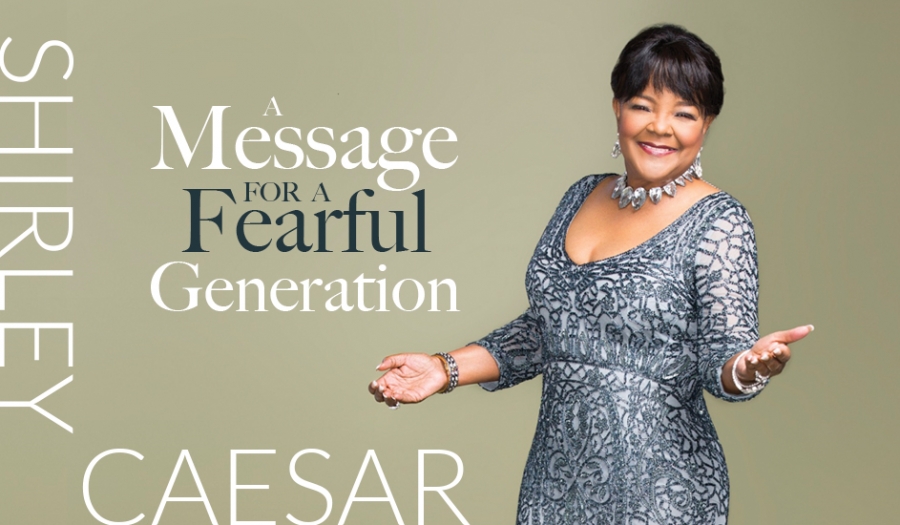
MD: With the Shirley Caesar Outreach Ministry, and even with pastoring, do you find that you’ve been able to redirect your maternal instincts?
SC: Oh, yes! All over the world. Everywhere I go. When I was a child, I started out as “Baby Shirley.” They called me “Baby Shirley.” Now they call me “Momma Shirley.” My, my, my. What a change, and I’m still here.
MD: Nice. So, tell me a little bit about your latest album, Fill This House. How is this album different from anything you’ve done in the past?
SC: Well, it is different because of all the stuff that’s going on right now in our country, and I’m focusing more on the U.S.A. [But], first, let me tell you, it’s different because I had more one producer. All those years, I’ve always had just one producer. But on this one, I had one, two, three … I think I had about five or six. […] But most of the words and ad libs flowed right out of my heart. Secondly, I wouldn’t know how to explain what I went through. This kid [Dylann Roof], on Bible study night, goes to the Mother Emanuel Church …
MD: You’re speaking of the Emanuel AME Church in Charleston, South Carolina?
SC: Yes. Mother Emanuel. He [Dylann Roof] goes in there, they embrace him, love on him, they receive him, and this coward — as soon as they bow their heads to pray — he pulls out a gun … shoots the first one. She didn’t even know what hit her. I’m telling you, I was so angry. From that, I was angry that he would go in the church and do that. For two Bible studies in my church, two Wednesday nights, I talked about it and the church knew how it had affected me. Why? Why would this kid come in and take the lives — four of them, I think, were preachers — four or five of them were preachers … come in for no reason, and take the lives of these innocent people. Anyway, I’m grateful for the songwriters who wrote my song, “Mother Emanuel.” That song is on my CD. I had to forgive that kid, and I did. I did, but I still don’t understand, and yet I do. So, it is songs like that. The song says, “If you ever needed the Lord before, we need Him now.” That’s a powerful, powerful song. I witnessed hospice two years ago … my husband, we put him in hospice. When I was singing [“Fill This House”], all I could see was my husband laying there breathing faintly his last breaths. All I could think of was, “Lord, let Your glory fill the house … fill that room where that dying person is … my dying husband … fill the room … let Your glory … let Your mercy, mercy, mercy.” And, so, this is how the CD, and all through it, every song, it just blesses me. I play it in the car … I wouldn’t care who was singing it. […] I know that there is nothing new under the sun. There aren’t any new sins. The same old devil, [and] really the same old sins. And that’s how the CD really came about. I hope and pray that everybody will get it — not because I’m the singer, but because of what the message is portraying.
MD: You mentioned forgiveness. You mentioned that you were able to forgive Dylann Roof (who took the lives of the nine victims in Charleston). How would you define forgiveness, Pastor Caesar? What exactly is forgiveness?
SC: Well, forgiveness is putting yourself in their place and telling yourself, “I want them to forgive me.” Forgiveness is the fact that Jesus went to Calvary and shed human blood — because He was both God and man. He was human and divine. He died a cruel, a horrible death for me. And, at the end of it, He said to me, “Shirley Ann, you are forgiven. You are forgiven.” Then He turned around and said to me, “If you don’t forgive, how can I forgive you?” So, I had to put it behind me and go on with my life. I can’t forget what [Dylann Roof] has done, but mercy causes me to forgive him … to say to him, “Son, I forgive you.” Even some of the families [of the victims], they say that they have forgiven him. So, I cannot preach forgiveness, and I myself not show mercy.
MD: I’m sure many people have asked you about your legacy. You’re iconic, and you have been honored in so many different ways. So, when it’s all said and done, at the end of your life, what would you like your legacy to be?
SC: That I was a person who [gave] mercy. That I was a humanitarian. That I not only talked the talk, but that I walked the walk. That I believed in the fact that Jesus plus education equals success. So, I would like for my legacy to be one [that says] I was a well-rounded person. I don’t just believe that singing is all you can do. I want to be remembered as a person who spoke up — and who spoke out. That’s just a few of the things that I’d like to be remembered for. ![]()








